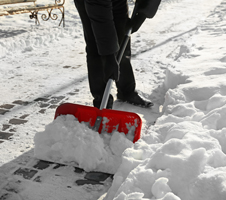Safety Tips for Shoveling Snow
January 26, 2018 As surprising as it may sound, the National Safety Council (NSC) reports that thousands of people are injured – and as many as 100 die – from snow shoveling-related injuries and medical complications every year. According to medical professionals, shoveling snow can put lots of stress on a person’s heart. As such, it’s best to take some added precautions in the following months and make sure that if you’re going to be shoveling snow that you do it safely and limit the chances of getting injured.
As surprising as it may sound, the National Safety Council (NSC) reports that thousands of people are injured – and as many as 100 die – from snow shoveling-related injuries and medical complications every year. According to medical professionals, shoveling snow can put lots of stress on a person’s heart. As such, it’s best to take some added precautions in the following months and make sure that if you’re going to be shoveling snow that you do it safely and limit the chances of getting injured.
While shoveling is physically demanding, being outside in the cold for prolonged periods of time can cause dangerous health effects all on its own. In cold weather, blood clots are more likely to occur because the arteries constrict. Furthermore, cold temperatures are known to create elevated blood pressure and faster heart rates. Shoveling snow or using a snow blower can seem like easy tasks, but the truth is that snow weighs a lot and the body also functions differently in chilly temperatures.
Individuals who have a history of heart problems or disease need to speak directly with a medical professional before doing any kind of snow maintenance – even if it’s using a snow blower instead of shoveling. If you’re shoveling snow or using a snow blower and begin to feel faint, dizzy or chest tightness, stop immediately and consider calling 9-1-1.
Whether or not a person has certain preexisting health problems or conditions, the NSC offers some general, useful shoveling safety tips:
- Only shovel newly fallen, powdery snow – it’s much lighter and less physically demanding;
- Lift with your legs and not your back;
- Instead of lifting snow, push it with the shovel – and if you do lift snow, don’t fill your shovel completely;
- Don’t shovel if you’re eating or smoking;
- Stretch beforehand and work slowly, and:
- Stop shoveling if you are becoming tired or exhausted
Snow blowers are known to cause injuries to adults, kids and even pets. The Consumer Product Safety Commission (CPSC) reports thousands of injuries to consumers annually. Some of the most common injuries associated with snow blowers include lacerations, amputation and severe bone fractures – and in some instances, children have been strangled after getting clothing stuck in a snow blower. As with all other powered products, snow blowers can cause permanent, debilitating injuries and should always be used with extreme caution.
If you own a snow blower or plan to use one for snow removal purposes, take a look at the following safety tips:
- Never drink alcohol or do drugs and then use a snow blower;
- Remember there is the risk of carbon monoxide exposure when a snow blower is powered up in enclosed spaces;
- Only refuel snow blowers when they are turned off;
- Always keep your hands away from all moving parts, and:
- If there is a jam, turn the snow blower off before attempting to clear it
Keep cold exposure in mind as you’re outdoors clearing snow or ice from your property. Even though a person may feel like he or she is getting warm from physical activity, cold temperatures can still inflict serious bodily injury or harm. Moisture plays a large role in the development of both hypothermia and frostbite; becoming sweaty from shoveling snow can contribute to this overall risk.
To avoid becoming sick or injured from cold exposure, ensure dressing properly. Layering and wearing moisture-resistant items – especially on the feet, hands and head – can help prevent injuries associated with cold exposure. If you’re going to be using a snow blower, be particularly wary and careful about clothing – especially items that hang, like scarves, jackets, etc. – since they can get pulled inside the auger (the rotating bit) and cause strangulation.
When there’s snow on the ground, people will be outside shoveling, using snow blowers and clearing their properties from snow and ice in other ways. To stay protected and safe, the best bet is simply to take a few precautions, take breaks if you need to and to keep a watchful eye out for warning signs (especially if you have preexisting heart disease). No matter how much snow may be on the ground, getting injured or becoming ill from shoveling is not worth it. If you have any questions or concerns about any illnesses or injuries you sustained as a result of shoveling snow or using a snow blower, please contact a representative at our firm.
Philadelphia Personal Injury Lawyers at Galfand Berger, LLP Representing Injured Individuals Since 1947
If you have any questions or concerns about injuries or damages you sustained, please contact our Philadelphia personal injury lawyers at Galfand Berger. With offices located in Philadelphia, Bethlehem, Lancaster, and Reading, we serve clients throughout Pennsylvania and New Jersey. To schedule a consultation, call us at 800-222-8792 or complete our online contact form.
 Google Screened
Google Screened
